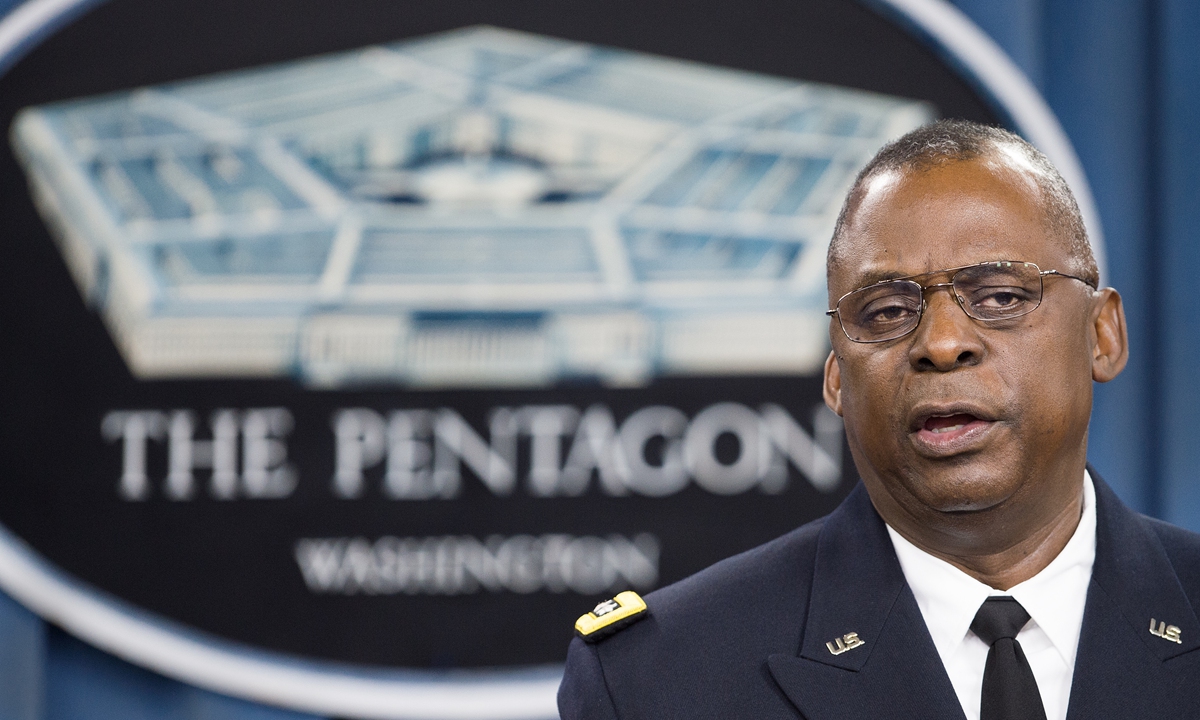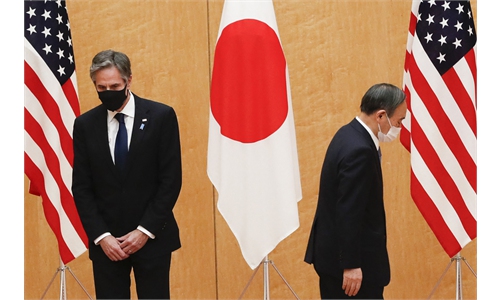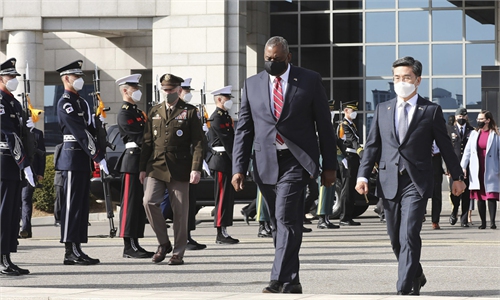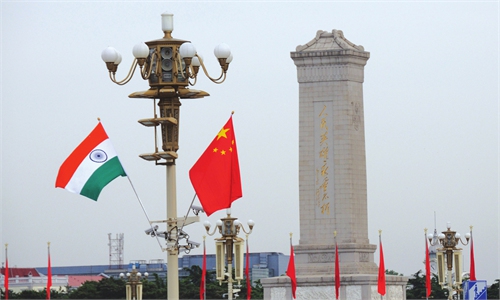India won’t fall into US appendage as Japan given major power ambition, economic reliance

Lloyd Austin Photo: AFP
US Defense Secretary Lloyd Austin started his visit to India on Friday with China on his mind, while observers noted that despite deepening security partnership, India will not downgrade as a US' appendage like Japan since New Delhi seeks major power autonomy.Austin's visit follows his visits to Japan and South Korea for 2+2 dialogues, and coincides the China-US high-level meeting which started with unusual intense tit-for-tat remarks.
Observers pointed out that the US wants to persuade India to join its chariot to encircle China with benefits in military equipment and intelligence sharing, but India seeks to be a major power politically, and their (US and India) strategic goals do not match.
Austin arrived late afternoon on Friday and is scheduled to meet his Indian counterpart Rajnath Singh on Saturday, according to media reports. Austin will also talk with India's National Security Advisor Ajit Doval about China and important regional security issues including Afghanistan.
Reuters reported that the two sides are expected to discuss India's purchase of US armed drones and combat jets. India's proposed purchase of the Russian S-400 missile defense system, which may draw US sanctions, is a conflict point.
Qian Feng, director of the research department at the National Strategy Institute at Tsinghua University, told the Global Times on Friday that the early visit of a new US cabinet member to India shows the US is attaching increasing importance to India in its Indo-Pacific strategy, citing the Quad and intelligence sharing agreements.
The Trump administration's first cabinet secretary to India was then Secretary of Defense Jim Mattis, who visited in September 2017, nine months after Donald Trump took office.
But Qian stressed India, hoping to be a great power politically with strong nationalist sentiments, will not be a US appendage like Japan or act like a striker for the US like Australia.
Japan, after the 2+2 dialogue with the US, issued an acrimonious statement, which the Chinese Foreign Ministry noted to be a signal of Japan downgrading as a US strategic appendage. Australia, despite its trade heavily dependent on China, has run at the front of US allies in criticizing China over a wide range of issues, from Xinjiang to Hong Kong.
Song Zhongping, a military expert and TV commentator, told the Global Times on Friday that the US wanted India to cooperate with it on the Indian Ocean, as part of its strategy to contain China at sea. Engaging Japan and Australia is of the same purpose in other directions.
But India, with a strong presence in the Indian Ocean, does not want to appear as a US follower, Song said.
Indian media has been cooking up India's role in the upcoming Quad-plus-France military drills in Bay of Bengal, reflecting it wanted to show its dominance in the region, analysts said earlier.
Song also noted allying with the US may severely jeopardize its relations with Russia and strain China-India ties.
The China-India border clashes in 2020, which brought about casualties on both sides, pushed India toward the US, with Washington helping New Delhi by leasing surveillance drones and supplying cold-weather gear for Indian troops.
China-India tensions have de-escalated and been managed with the disengagement of border troops, which "created room for relationship restoration," Qian said.
Despite military clashes in 2020, China surpassed the US as the largest trading partner of India in the first nine months of India's fiscal year 2020-21 (from April to December 2020). India exports to China were $15.3 billion while imports hit $45.4 billion, showing the two are deeply intertwined and a political setback cannot change these economic realities, analysts said.
Some politicians wanted India to decouple from China and had proposed such policies, such as restrictions on Chinese direct investments and sanctions to Chinese apps.
Qian noted decoupling is extremely difficult if not completely impossible, and that strategy will cost much for the coronavirus-stricken country which is expected to see a 7.7 percent GDP contraction.
Mumbai-based columnist Rupa Subramanya also wrote in an article earlier that "China is the rival India cannot live without," showing the country's continuous vigilance against China together with economic dependence.
Chinese State Councilor and Foreign Minister Wang Yi set the tone for China-India relations at a press conference on March 7, saying "The boundary dispute, an issue left from history, is not the whole story of the China-India relationship."
China and India have broad common interests and tremendous potential for cooperation. The two sides need to help each other succeed instead of undercutting each other, and should intensify cooperation instead of harboring suspicion at each other, Wang said.



